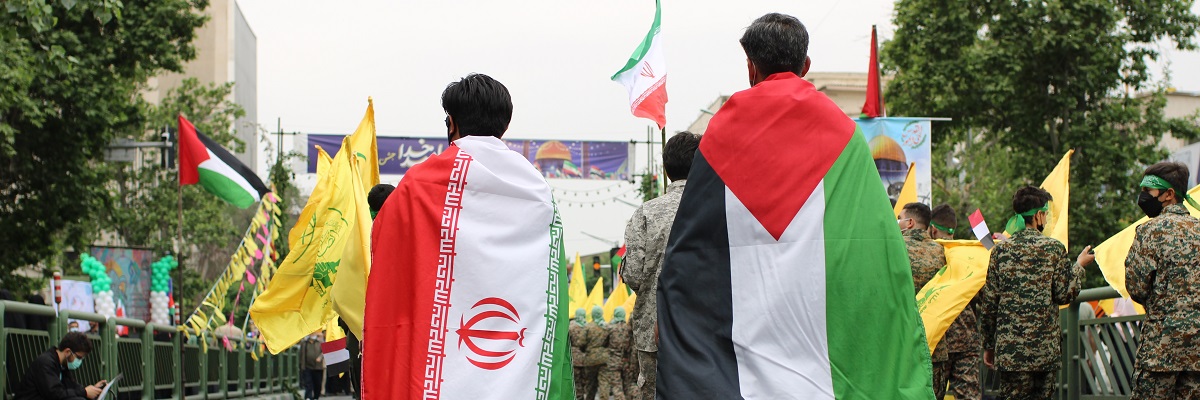Diplomacy
Political Insights (7): Determinants of the Iranian Policy on Operation al-Aqsa Flood and the Israeli War on Gaza Strip

Image Source : Shutterstock
Subscribe to our weekly newsletters for free
If you want to subscribe to World & New World Newsletter, please enter
your e-mail
Diplomacy

Image Source : Shutterstock
First Published in: May.09,2024
Aug.13, 2024
Iran, like other parties, was taken aback by the Hamas attack on 7/10/2023 in the Gaza Strip (GS) envelope. This occurred at a critical juncture for Iran, as it had recently finalized a prisoner exchange agreement with the United States (US), unlocking $6 billion of its frozen oil revenues in South Korea just two months prior. The attack coincided with Iran’s efforts to ease tensions in regional relations, exemplified by its landmark agreement with Saudi Arabia on 10/3/2024. This analysis delves into Iran’s response to Operation al-Aqsa Flood, examining the factors influencing its stance and actions.
Iran has consistently backed the resistance since the war’s onset. However, its stance on Operation al-Aqsa Flood was marked by meticulous calculations and intricate balancing acts, aiming to safeguard and fortify gains while averting potential adverse repercussions. Key factors shaping Iran’s approach to Operation al-Aqsa Flood include: 1. Reiterating the pivotal role of Palestine in Iranian foreign policy, particularly in supporting Palestinian resistance and rejecting recognition of the Israeli regime. 2. Geopolitical considerations and Iran’s aspiration to bolster its regional presence and influence as a pivotal force, safeguarding significant gains achieved in preceding years. 3. Iran aims to uphold its strategic alliances with affiliated forces and movements in the region, particularly those aligned with the resistance front. This entails bolstering the strength and influence of these movements while ensuring their continued relevance in the regional landscape. 4. Iran seeks to fortify its regional deterrence capabilities, with a specific focus on managing relations with Israel. Accumulating strength is regarded as a pivotal Iranian strategic imperative in this regard. 5. Iran’s desire to steer clear of entanglement in a widespread regional conflict or direct confrontation with the US is evident. The swift dispatch of US warships to the region serves as a clear message aimed at dissuading Iran from direct participation in the standoff. 6. The challenges confronting the Iranian economy amidst ongoing international sanctions, soaring inflation rates and the depreciation of the Iranian currency. 7. Iran’s immediate focus on de-escalation with the US and European countries, alongside sustained engagement with influential regional stakeholders.
The key aspects of the Iranian stance regarding Operation al-Aqsa Flood are as follows: 1. From the outset, Iran has been eager to disassociate itself from the October 7 attack orchestrated by Hamas. It has stressed that the operation was an independent decision made by Palestinian resistance factions based on their own assessments and considerations. Supreme Leader Ali Khamenei explicitly refuted any Iranian involvement, a position reaffirmed by the Permanent Mission of the Islamic Republic of Iran to the United Nations (UN). This denial was also echoed by the US administration, with President Joe Biden telling 60 Minutes in an interview, on 15/10/2023, that “there is no clear evidence” implicating Iran in the Hamas attack. 2. The Iranian leadership across all branches (including the Supreme Leader, the Presidency, the government, the military, the Revolutionary Guards, legislative bodies and the media…) has provided robust political backing to the Resistance. They have hosted prominent delegations from Hamas and resistance factions, notably welcoming Isma‘il Haniyyah, the leader of Hamas, on two occasions. Iran has consistently adopted and defended the resistance and its objectives in both regional and international forums. 3. Iran has maintained its military and financial backing for the resistance as part of its longstanding policy, although specific details regarding the magnitude of this support and its delivery methods remain unclear. 4. While denying direct involvement in the October 7th attack, Iran has lauded the operation and reiterated its solidarity with the Palestinian resistance. This support was evident during Operation al-Aqsa Flood and in response to Israeli aggression in Gaza, where Iran endorsed the political and on-the-ground strategies pursued by the Palestinian resistance in managing the war. 5. Since the outset of the war, Iran has demonstrated a clear intention to swiftly conclude hostilities and secure a lasting ceasefire. Iranian diplomacy, spearheaded by Foreign Minister Hossein Amir-Abdollahian, has diligently pursued this goal. 6. Despite its reluctance to engage directly in the war theater and to avert escalation into a broader regional conflict, Iran has encouraged its allied forces in Lebanon, Yemen, and Iraq to actively support the Palestinian resistance, tailoring its involvement to the specific circumstances of each theater. It is evident that Iran has played a significant yet undisclosed role in coordinating actions across the various theaters of the conflict. 7. When faced with the Israeli airstrike on its consulate in Damascus on 1/4/2024, Iran responded with meticulous caution and strategic calculations. Ensuring its retaliation on 13/4/2024 conveyed a powerful deterrent message to Israel. It carefully avoided escalating the conflict into a broader confrontation, when it intentionally announced its response beforehand, allowing Israel and its allies ample time to prepare for the launched rockets and drones. Furthermore, Iran selectively targeted military installations, refraining from unveiling any new strategic weaponry. According to Israeli military officials, “In the attack, 185 drones, 36 cruise missiles and 110 surface-to-surface missiles were fired toward Israel,” The New York Times newspaper reported. Regardless of the precise accuracy of these figures, the response was significant and expansive, serving as a demonstration of force and a bolstering of Iran’s regional standing. The objective seemed more focused on asserting deterrence rather than inflicting substantial damage. Following the Israeli response on 19/4/2024, which was notably restrained and targeted select Iranian sites without an official declaration, Iran demonstrated a commitment to crisis containment and a desire to prevent further escalation. 8. In terms of popular interaction, the Iranian street witnessed a wide mass movement in support of the resistance and the Palestinians in GS, similar to the ongoing state of popular sympathy in the Arab and Muslim world.
Iran’s stance during Operation al-Aqsa Flood has yielded both positive and negative repercussions, among the most significant being: 1. A resurgence of tension in Iranian-Western relations ensued, evidenced by the US House of Representatives’ decision on 30/11/2023 to reinstate the freeze on the $6 billion previously lifted on 10/8/2023 and deposited into Qatari banks, before being accessed by Iran. Subsequent to Iran’s assault on Israel on 13/4/2024, the US, along with several European countries, imposed additional sanctions on Iran. 2. Iran’s reputation and standing suffered a blow due to its reserved and cautious stance at the onset of the conflict. This approach failed to meet the expectations of Palestinian, Arab and Islamic public, given the promises and positions expressed in previous years. Many within these circles perceived Iran’s response as falling short during a critical moment when robust support, beyond mere political and media endorsements, was direly needed. However, Iran’s image and status experienced a notable enhancement following Hizbullah’s significant involvement on the northern front during the months of the confrontation. Additionally, the escalating role of the Yemeni Ansar Allah group in the Red Sea and the Arabian Sea, particularly in actions against Israeli shipping and vessels bound for Israeli ports, further contributed to this improvement. Moreover, the participation of the Iraqi resistance also played a role in bolstering Iran’s reputation and standing. In a late March 2024 Jordanian elite opinion poll, it was revealed that Iran’s reputation and influence in the Arab world saw a 42% increase due to its stance on the GS war. Additionally, 45% of respondents stated that Iran and its allies’ position contributed to the reduction of sectarian divisions in the region. 3. Iran successfully navigated the initial challenge of applying the slogan of Unity of the Arenas among the parties within the Axis of Resistance. The increased involvement of its allied forces in the conflict marks a tangible step forward, offering potential for further advancement in realizing the slogan. 4. The conflict has significantly impacted Israel’s strategic standing in the region, tarnishing its reputation as a regional stabilizer and a bastion of Western influence. It has also hindered progress in normalization efforts and fueled increased backing from Arab, Muslim and international public for Hamas and the resistance factions. This dynamic bolsters Iran’s political stance, particularly given the perceived inadequacy of Arab official interaction with the resistance and responses to the brutal Israeli aggression on GS. *** In the forthcoming period, Iran is expected to persist in navigating a cautious and balanced strategy concerning Operation al-Aqsa Flood and the Palestine issue. Within this framework, Iran aims to bolster its backing for the Palestinian resistance and its regional footprint while sustaining a trend of improved relations across the region. Additionally, Iran is likely to pursue efforts to defuse tensions in its dealings with the US and Western nations. Political Insights: A periodic series that provides brief and condensed political analyses and position assessments, issued by Al-Zaytouna Centre for Studies and Consultations. The opinions expressed are those of the authors and do not necessarily reflect the views of World & New World Journal.
First published in :

A Jordanian journalist and author of Palestinian origin, editor-in-chief of Assabeel newspaper, and an expert in Palestinian and Jordanian political and strategic affairs. He has published dozens of articles, political analyses, situation assessments and papers, in addition, he is frequently hosted by TV and radio channels. He also participates in many of al-Zaytouna Centre’s activities, and contributes in writing strategic assessments.
Unlock articles by signing up or logging in.
Become a member for unrestricted reading!